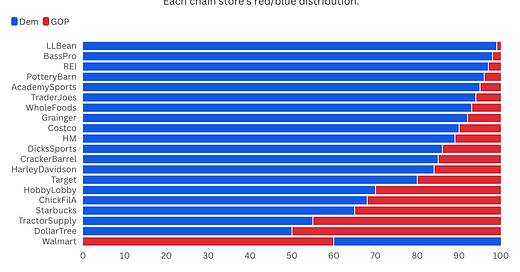Keep Plans and Carry On... or Progress Further?
By definition, sustainability is long-term planning. Businesses staying the course or doubling down on sustainability are further separating themselves from greenwashers and greenhushers.
When it looked like Donald Trump might be re-elected last year, the world’s fourth largest wind energy company, EDP Renováveis, started loosing stock value. Then, after the election, the company suddenly lost more than ten percent. The slide continued and the stock price bottomed out just after President Trump announced sweeping tariffs, a day The Economist termed “Ruination Day.”

One might have expected another tumble last Monday, June 17, when the Portuguese company’s CEO told reporters (e.g., Reuters) the company will stay the course of installing new capacity in the U.S. even if tax credits for wind-generated energy are phased out:
"The renewables bet in the U.S. is here to stay. In 2024, we installed 2 GW there and this year we will install 1 GW and up to 750 megawatts in 2026 as planned."
But the stock price held, and EDP Renováveis continues its rebound.
As reported earlier on SustainLab, sustainable practices are easier to implement when governments are on board, but there is plenty that businesses, market authorities, universities, institutions, and individuals can do without governments.
As regards businesses, for those such as renewable-energy provider EDP Renováveis, implementing sustainable practices just means reaffirming what their business does. For others, like the six U.S. banks that backslid on Environmental, Social, and Governance (“ESG”) goals even before Trump’s inauguration, maintaining sustainable practices means pivoting from sustainability-as-transformation to sustainability-as-preservation, which such financial-sector businesses can more easily do without transforming what it is they provide. Still other businesses are hiding, changing, or rebranding (a.k.a. “greenhushing”) their prior sustainability commitments to reduce the risk of ire from the Trump Administration or from their customers. That’s what Costco did, for example, in renaming their Diversity Equity and Inclusion (“DEI”) initiative “People and Communities.” But the choice to stick with sustainability practices — at least for major U.S. chain-stores — sometimes seems like it comes down to the top-3 most important factors in real estate, namely:
location
location
location

There’s another option, though, beyond ending, rebranding, or recommitting to sustainability practices. As sustainability scholars Amanda Williams, Lucrezia Nava, and Gail Whiteman wrote (June 2, 2025) in Stanford Social Innovation Review, that fourth option is:
"Foster. It remains to be seen if and how companies can turn Trump-driven backsliding into an opportunity to redefine and accelerate sustainability. Some corporate leaders are not just holding their ground but actively doubling down, investing more, innovating, and expanding sustainability efforts beyond their existing efforts. Although fossil fuels are becoming cheaper, companies can make even stronger climate commitments to transition to cleaner energy sources."
-- From "Sustainability Backsliding Doesn’t Have to Mean Back to Square One" published June 2, 2025 in Stanford Social Innovation Review, emphasis added.In these uncertain times, what a difference a month makes. Today, who knows what will happen hour by hour?
Already with Israel’s campaign against Iran, the price of fossil fuels has gone up, particularly the price of oil. Now, according to reporting from The Guardian, because of the U.S. bombing, Iran’s parliament “voted to shut down the vital Hormuz shipping channel in retaliation” through which a fifth of the world’s oil passes, which may cause oil prices to climb much higher.
So for those businesses that are transitioning to electric or hybrid vehicles, now may be the perfect time to speed up that sustainability transition.
That goes for the United States Postal Service, too, if it can be arranged with Republican support in Congress. Earlier this year, the USPS was set to purchase tens of thousands of electric vehicles for mail delivery and transportation. However, in the Republican’s massive tax and immigration legislation (referred to as “TOBBA” here in SustainLab, a bill that is now under consideration by the U.S. Senate), there are plans that would “undo more than 10 years of planning and work on our delivery fleet replacement” writes Peter R. Pastre, the USPS’s Vice President of Government Relations and Public Policy. The idea in Congress under debate is whether to auction off the electric vehicles and supporting infrastructure in order to offset borrowing for the debt and to help pay for the planned tax cuts. But as Jacobe Bogage in The Washington Post reports (June 21, 2025), the delivery trucks are for postal workers who drive on the right side, so:
“The proposal is unlikely to generate much revenue for the government; there is almost no private-sector interest in the mail trucks, and used EV charging equipment — built specifically for the Postal Service and already installed in postal facilities — generally cannot be resold.”
From "Trump and GOP’s tax bill would sell off USPS’s brand-new EVs" published June 21, 2025 by The Washington PostGiven political headwinds, fluctuating oil markets, and legislative rollbacks, sustainable business is neither simple nor singular. But as these business cases show, backsliding on sustainability is not inevitable. Resilience, foresight, and a long-term view can not only keep sustainability alive — but thriving — amid uncertainty. So the question is not whether the sustainability transition will face challenges, but how leaders will respond: with retreat, rebranding, recommitment, or renewal.
How resilient are the sustainability practices in your habitat to political or economic changes and challenges?




